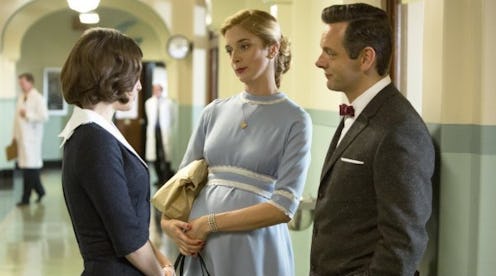Entertainment
'Masters of Sex' Shows Ambition, Good & Bad

Ambition is equal parts friend and enemy. The necessary self-delusion that what you perceive you can do will change the game, better society, or fulfill some purpose greater than yourself is never easy and often a quite hard, alienating experience, and the folks over at Masters of Sex dissected this in their Season 1 finale. Wanting to always come out on top can be a bit of a risk.
In "Elvis Has Left the Building," the stage for Masters and Johnson's ongoing saga was set: often because heart took precedent over head. Head is ambition's best friend, a necessary compatriot to ensure unfettered domination over the goal at hand, after all. So to misstep into the pools of heart's tempestuous waters can only spell one thing: disaster.
Which is why Virginia Johnson ended up in the captain's seat at the end of the episode. With both Masters and Haas proverbially (and literally) knocking at her door, the men have laid their cards out on the table in order to convince the woman they both love (L'horreur! Quel scandale!) that they need her — not that she needs them, which is a nice bit of a turnaround from both of their previous positions.
While ambition is a driving force for most of the main players involved, for Johnson it feels like a tool: another aspect of the Swiss army knife that is her dynamic existence. She wants greatness, no matter what it is, which is why she's more than happy to push for Dr. DePaul and her study (while also casually mentioning another, unrelated study they could tag onto hers).
The same goes for Barton Scully — funny how the two outsiders to the old straight white man's world are the ones who see how detrimental emotions can be to goals, eh? Scully just wants to be normal. He wants to not feel ashamed, to erase the gay man inside of him, and his ambition to live in normalcyville push him to the extreme arms of gay conversion therapy.
Being pushed past the point of no return, though, were undoubtedly Ethan Haas and Bill Masters — though not for reasons you might think. Sure there's the on-the-surface level love triangle between Johnson and the men, but it's so much more than that. Haas' relationship with Johnson started with the slap attack heard 'round the world, and has ended with him showing his hand too eagerly, too early (as is his general wont to do, the emotional little bugger-in-love that he is), leaving Johnson with far too many options and hypotheticals — Haas doesn't even know where he's going to end up, geographically speaking — to allow her to think with her heart. If this effectively pushes her into Masters rain-soaked arms, no one would be surprised, right? (Spoiler alert: no one should be surprised. This is all based on two real people, after all.) Ultimately, Johnson has the opportunity to make her own rules: the one thing she's desired her whole life over everything else: Autonomy, control, the decision-making power.
The balance of emotional intelligence coupled with a logical approach to ambition's benefits does have its drawbacks, of course. Where a great innovator might err on the side of the bigger risk because of the emotions involved, someone more interested in glory for glory's sake may be more cautious — leaving an opportunity for a more stagnated accomplishment than what could have been. Of course that 'what-could-have-been' factor is what pushes ambitious types to the next project, the next great thing that needs to be conquered. It also leaves ambitious people with heaps of regret. And something tells us that regardless of the decision Johnson makes, in the end she will come to regret something about how it all goes down, because that's what we humans do. We see the future, the possibility, and we're excited by it: but if we're not too careful, we also drown in it.
Makes you wonder if the players involved will be conquered by, or will be the conquerers of, their own ambitious desires.
Image: Showtime